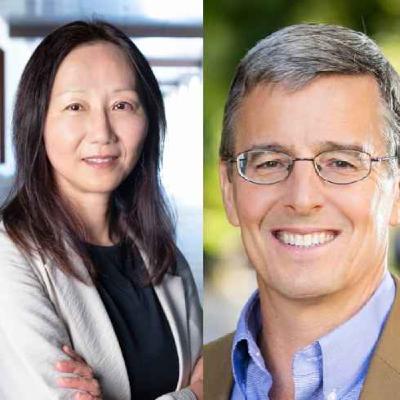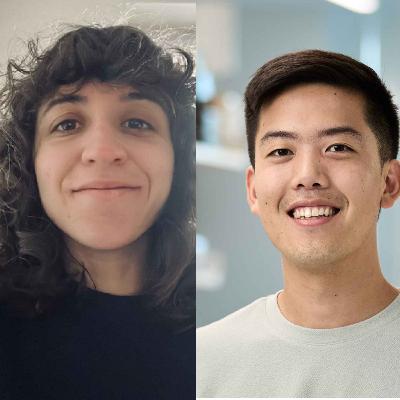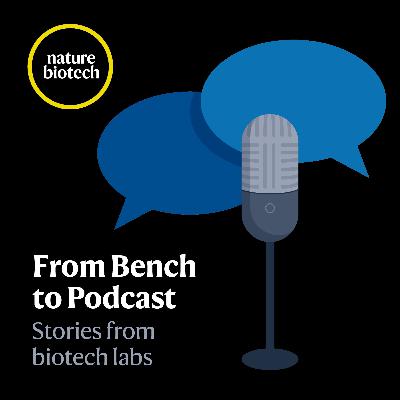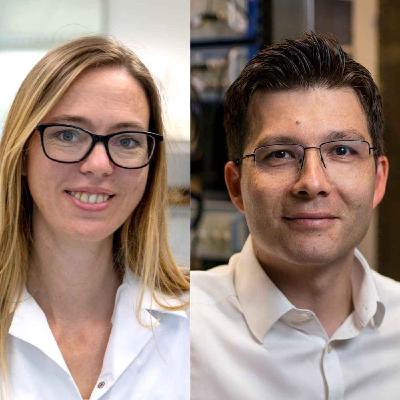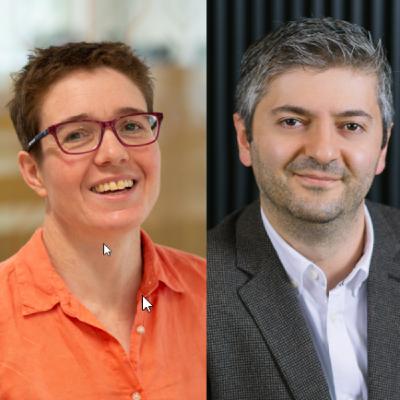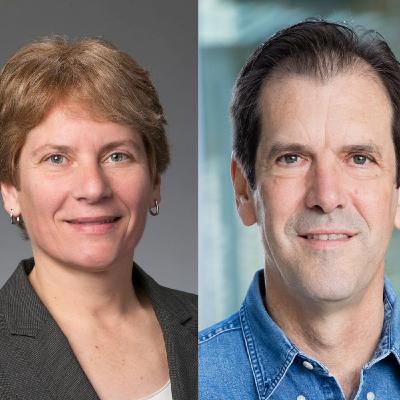Discover Forum
Forum

Forum
Author: Nature Biotechnology
Subscribed: 52Played: 461Subscribe
Share
Description
Nature Biotechnology's Forum podcast explores biotech's latest scientific publications, found in Nature Biotechnology and elsewhere, through discussions with today's leading researchers.
Hosted on Acast. See acast.com/privacy for more information.
35 Episodes
Reverse
Clinical grade electronic wearable technology today can be flexible, stretchable, and skin-like, as researchers have developed materials that can help electronics interface with your body. Chief Editor Barbara Cheifet speaks with Drs. Zhenan Bao and John Rogers about the many devices that they are working on – from health monitoring in neonates to smart bandages for wounds – and how they will complement and advance global health. Hosted on Acast. See acast.com/privacy for more information.
Photoacoustic imaging, or optoacoustic imaging, combines both optical imaging and ultrasound technology to generate high-resolution images of biological tissues. Chief Editor Barbara Cheifet speaks with Drs. Vasilis Ntziachristos and Junjie Yao about how photoacoustic imaging, developed back in the 1970s, is now moving towards translational applications such as diagnostics and disease monitoring. Hosted on Acast. See acast.com/privacy for more information.
Biomolecular ultrasound is an exciting technology that uses sound waves to visualize tissues within the body. Chief Editor Barbara Cheifet speaks with Drs. David Maresca and Mikhail Shapiro about using ultrasound for imaging and also how the technology is being used to drive the transport of engineered molecules across cellular membranes for a wide range of applications. This includes their recent work mentioned in the episode https://doi.org/10.1126/science.ads1325 and https://www.science.org/doi/abs/10.1126/science.adt0293 Hosted on Acast. See acast.com/privacy for more information.
Foundation models are machine learning models trained on large datasets and applicable for a wide range of use cases. Chief Editor Barbara Cheifet speaks with Drs. Brian Hie and Marie Lopez about how these models are being used for analysis of the function and structure of DNA, RNA, and proteins, and how they are being developed for clinical use. Hosted on Acast. See acast.com/privacy for more information.
In this episode, Associate Editor Cláudia Vilhena sits down with Ali Shaib, the lead author of an exciting new study showcasing expansion microscopy and the visualization of individual protein shapes, using standard laboratory microscopes.Tune in as Ali and Cláudia explore the “accidental” origins of the study, the importance of mentorship and collaboration, and the democratization of super-resolution methods.If you're curious about the intersection of super-resolution microscopy and clinical applications, this is an episode you won’t want to miss! Hosted on Acast. See acast.com/privacy for more information.
On this episode, our Associate Editor Cláudia Vilhena interviews Chloe Fishman, the first author of a great story on a new and versatile tool using recombitrons for bacteriophage gene editing. Join us as Cláudia and Chloe touch bases on the advantages of this tool over existing methods, discuss the relevance of phage therapy on the fight against antimicrobial resistance and share their thoughts on the crucial role mentorship plays in empowering early career researchers. If you are interested in phage therapy and astrobiology, then this episode is for you! Hosted on Acast. See acast.com/privacy for more information.
On this episode, our Associate Editor Cláudia Vilhena interviews Nicoletta Cieri, the first author of a great story on how a devised analytic framework can aid the prevention of post-transplant disease recurrence.Join us as Nicoletta and Cláudia explore the highlights of the story, discuss the future of individualized medicine and touch-bases on future career opportunities following the postdoc phase.If you are interested in anti-tumor responses and personalized medicine, then this episode is for you! Hosted on Acast. See acast.com/privacy for more information.
In this episode of Forum, Chief Editor Barbara Cheifet speaks with Madeline Lancaster and Sergiu Pasca about organoids – cell cultures derived from stem cells and crafted to replicate a particular organ or certain cell types that make up an organ. These two experts in the field discuss neural organoids specifically, and how they are being used to study both basic biology of the brain and their future impacts on disease research. Hosted on Acast. See acast.com/privacy for more information.
On this episode, our Associate Editor Cláudia Vilhena interviews Sean Johnson, the first author of a timely and great story on how to experimentally evaluate the performance of AI-generated enzymes.Sean and Cláudia discussed the timely topic of AI for protein design and the implications for future research, and also touched base on how it was to transition from academia to industry.For those who are interested in protein functionality, this episode is for you! Hosted on Acast. See acast.com/privacy for more information.
On this episode of From Bench to Podcast, our Associate Editor Cláudia Vilhena interviews Roman Sarrazin-Gendron, first author of an absolutely incredible story about...videogames!During this informal chat, Roman and Cláudia talked about the behind the scenes of Boderlands Science. They explored the concepts of Citizen Science, Massively Multiplayer Online Video Games, and the impact of community work on gathering data about our microbiome.For those that love microbiology and/or video games, and wish to know how these two worlds merge, this episode is for you!Check out the trailer and spot the famous actress!https://www.youtube.com/watch?v=L_mH6Ak_Ny0&t=5s Hosted on Acast. See acast.com/privacy for more information.
On this episode, Chief Editor Barbara Cheifet speaks with Polina Anikeeva from MIT, Grégoire Courtine from EPFL, and Jocelyn Bloch, a neurosurgeon at Lausanne University Hospital. These three leaders in the field of neurotechnologies discuss new devices that help us learn how our brain works, implantable brain-computer interfaces that are helping patients with neurological disorders walk again, and why this field is so exciting today. Hosted on Acast. See acast.com/privacy for more information.
In this episode, our Associate Editor Cláudia Vilhena talks with three authors of the method Starfysh, a computational toolbox combining spatial transcriptomics and histology data.During their chat, Siyu, Yinou and Lingling, all at different stages of their academic path, dig into the layers of Starfysh and its relevance for cancer research. They also share the struggles of peer review, the wonders of collaborative work and how this experience shaped their, sure-to-be fantastic, academic careers. Hosted on Acast. See acast.com/privacy for more information.
On our very first episode of the new podcast series from Nature Biotechnology, our Associate Editor Cláudia Vilhena interviews Marcus Walker, first author of a fantastic story on engineered bacteria used to stain textiles.With an informal and honest touch, Marcus and Cláudia dive into the behind the scenes of the paper. From the inspiration to combine microbiology and fashion, passing by what went wrong at the bench, all the way to the economical and environmental implications of living biomaterials.For all those who struggle with measuring optical density, this episode is for you! Hosted on Acast. See acast.com/privacy for more information.
For our special Focus Issue, Chief Editor Barbara Cheifet talks with Charlotte Deane and Gevorg Grigoryan about applying new machine learning methods to protein structure prediction and protein design. We discuss exciting new technologies and their current and future clinical applications. Hosted on Acast. See acast.com/privacy for more information.
Microscopy methods today are enabling researchers to see small details within cells, previously undetectable by light microscopy. Chief Editor Barbara Cheifet speaks with Drs. Ed Boyden and Johann Danzl about the technological advances and challenges in the fields of super resolution and expansion microscopy. Hosted on Acast. See acast.com/privacy for more information.
Single-cell metabolomics is focused on detecting, understanding, and interpreting metabolites and lipids at single-cell resolution. Theodore Alexandrov and Anne Le discuss recent technical advances in the field with Chief Editor Barbara Cheifet. Hosted on Acast. See acast.com/privacy for more information.
Chief Editor Barbara Cheifet speaks with Drs. Michael Fischbach and Sarkis Mazmanian about recent work uncovering functional roles for our microbiomes and what is needed to bring microbiome therapies to the clinic. Hosted on Acast. See acast.com/privacy for more information.
Jayme Locke and Megan Sykes discuss advances in xenotransplantation with Chief Editor Barbara Cheifet, including details of the recent transplants of pig heart and kidney into braindead patients, as well as the questions researchers and clinicians are asking next. Hosted on Acast. See acast.com/privacy for more information.
Aviv Regev and Sarah Teichmann talk with Senior Editor Barbara Cheifet about the development and exciting recent progress of the Human Cell Atlas project. Hosted on Acast. See acast.com/privacy for more information.
Senior Editor Markus Elsner has a discussion with Ray Deshaies and Carolyn Bertozzi about PROTACs, small molecules that have the potential to treat previously-undruggable targets in clinical applications. Hosted on Acast. See acast.com/privacy for more information.


